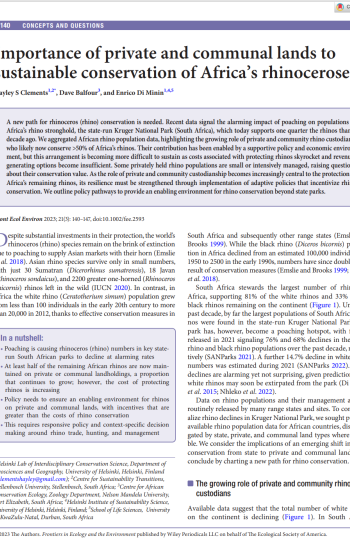

Importance of private and communal lands to sustainable conservation of Africa's rhinoceroses
A new path for rhinoceros (rhino) conservation is needed... We aggregated African rhino population data, highlighting the growing role of private and community rhino custodians, who likely now conserve >50% of Africa’s rhinos. Their contribution has been enabled by a supportive policy and economic environment, but this arrangement is becoming more difficult to sustain as costs associated with protecting rhinos skyrocket and revenue-generating options become insufficient...
As the role of private and community custodianship becomes increasingly central to the protection of Africa’s remaining rhinos, its resilience must be strengthened through implementation of adaptive policies that incentivize rhino conservation. We outline policy pathways to provide an enabling environment for rhino conservation beyond state parks.
Clements, H., Balfour, D. & Di Minin, E. (2023). Importance of private and communal lands to sustainable conservation of Africa’s rhinoceroses. Front Ecol Environ, 21(3), 140–147. (https://esajournals.onlinelibrary.wiley.com/doi/10.1002/fee.2593)
-

-
Dave Balfour
-
Enrico Di Minin
We support the free flow of information. Please share:
More content
-

Leveraging free trade to boost Africa’s wildlife economies through wild-harvested products
Dr Wiseman NdlovuThe intra-Africa trade of wild products presents a unique intersection of economic opportunity and environmental conservation. With the...
2024Research -

Insights from the African Wildlife Economy Colloquium
Klarine SchutteThe inaugural African Wildlife Economy Colloquium, held from 4–6 November at Stellenbosch University, brought together a diverse group…
Articles -

Drivers of hunting and photographic tourism income to communal conservancies in Namibia
Mr Joseph Goergen …Hunting and photographic tourism provide ecosystem services that can facilitate conservation. Understanding factors influencing how tourism industries generate...
2024Research -

SANParks Vision 2040: A New Era for Conservation in South Africa
Ms Emily TaylorReimagining Conservation: SANParks' Vision 2040
South African National Parks (SANParks) has unveiled its ambitious Vision 2040, a…
Articles -

In defence of wild meat’s place at the table
Tim VernimmenQ&A — Conservation scientist E.J. Milner-Gulland
Sustainable and safe consumption of wildlife is possible, and important for those…
Articles -

The diverse socioeconomic contributions of wildlife ranching
Candice Denner…The diverse socioeconomic contributions of wildlife ranching are increasingly recognized as a vital element of sustainable development, particularly...
2024Research -

A conflict of visions: Ideas shaping wildlife trade policy toward African megafauna
Mr Michael 't Sas-Rolfes…The issue of wildlife trade is a major concern for the conservation of African megafauna, such as elephants...
2024Research -

Barriers to the Participation of the Traditional Leadership Institution in Promoting Rural Agricultural Development
Dr Wiseman Ndlovu…The Traditional Leadership Institution (TLI) is constitutionally recognised to promote rural development in South Africa. It works with...
2022Research -

Elephant in the Room - Why a trophy hunting ban would hurt conservation and development
Prof Francis Vorhies“Trophy hunting, if well managed, conserves wild species and habitats and enhances livelihoods in rural communities.” - Dr...
2024Briefs
Get updates by email
Through impactful research, stakeholder engagement, and professional development, AWEI is supporting the wildlife economy across Africa. Please subscribe for occasional updates on our work and forthcoming events.
Sign up for a quarterly dose of AWEI insights
In a complex and changing world, AWEI generates strategic ideas, conducts independent analysis on wildlife economies, and collaborates with global scholar-practitioners to provide training and expertise for biodiversity conservation, climate resilience, and inclusive economic opportunities in Africa.
